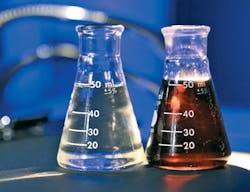About the author: Jon Sigona is president of Perfect Water Technologies. Sigona can be reached at [email protected].
Updated 11/9/20
We all want clean, sparkling water in our homes. But what happens when the clear water coming from the faucet has a bad odor? There are a number of reasons why tap water may have a strong scent of sulfur, chlorine or even a mossy, earthy smell.
Some of these odors are harmless, while others are cause for immediate concern. Here are several of the most common reasons tap water takes on certain smells and a few tips for addressing the issue. Does water have a smell?
Chemicals, Chlorine & Chloramines
Water treatment facilities utilize a variety of chemical processes to ensure drinking water is safe. So if you detect a slight chemical smell in tap water, it likely is a result of disinfection chemicals added by the water utility. This can be remedied with a catalytic carbon filter.
Most municipal water authorities will make public a list of the specific chemicals used in their water treatment process. Contact the local water utility if you have specific questions about the chemicals used.
Helpful Tip: Get to know the water treatment process and officials in your service area and regularly visit the utility’s website for water safety information. Also, if the local water utility uses chloramines, it is a good idea to more frequently inspect and replace interior household water lines, such as for the clothes washer and dishwasher, since rubber fittings and polyurethane fixtures lose their elasticity and are more prone to failure in water treated with these chemicals.
Water Smells Like Oil, Petroleum & Gasoline
Does the shower smell like a gas station? That oily petroleum odor could be an indication of iron-eating bacteria and iron in the water.
Iron in the water also can cause red stains on clothes and red discoloration on the tub and in the sink. Iron bacteria generally are harmless and are more common in groundwater. But the odor can be unpleasant and often is described as a fuel oil- or petroleum jelly-like smell that no one wants on their clothes, skin or hair, or in their drinking water. Iron bacteria also can damage many types of filtration media.
Another possible cause of a gasoline odor, and one that is dangerous, is actual gasoline in the water supply. An underground holding tank that has leaked or runoff from a spill can work its way into groundwater and pose a serious public safety and health hazard.
Helpful Tip: Contact the local water company immediately if there is a gasoline smell in the water supply. Better to play it safe!
Earthy Smells
While they may be subtle, musty, moldy, mossy smells that sometimes come from the kitchen sink can impact the flavor of drinking water. The first step in dealing with an earthy odor is to isolate the location of the smell to determine if it is indeed coming from the water, or if it is something in the pipe.
Start by filling a glass of water, straight from the tap, and then walk into another room. If the water smells OK, the offending odor likely is coming from a nearby drain. These smells can indicate the presence of decaying matter in the drain, such as food, hair, soap and other organic materials lingering in the pipe.
Although stinky, drain buildup typically is harmless and a thorough cleaning should remedy the smell.
If, on the other hand, the glass of water does contain the odor, conduct water testing and check with the local water provider to see if there were any changes to the water treatment process that may have caused the odor.
Helpful Tip: For earthy smells in drains, run a drain cleaner or garbage disposal cleaner through the pipe. A small mesh strainer placed on a drain can help catch hair, food particles and other debris.
Sulfur & Hydrogen Sulfide Gas
There is no mistaking that rotten egg smell that comes from hydrogen sulfide gas and sulfur bacteria. This smell can result from a number of sources. Some need immediate attention, but most are harmless.
For example, hydrogen sulfide gas can occur naturally in groundwater, and it also can be produced by sulfur bacteria in a well or in the water system. These bacteria thrive in warm water, so the smell may be more noticeable when the hot water is running.
This also could indicate the presence of the bacteria in the hot water heater. Many water heaters contain a magnesium corrosion control rod to reduce naturally occurring sulfates, but it often turns them into smelly hydrogen sulfide.
While these examples are not harmful to drinking water, there may be a pollution-related issue in the area causing the smell, which could be dangerous. A leaking fuel tank, old pipeline, busted septic system or seepage from a landfill can find its way into the water supply and make drinking water unsafe.
Helpful Tip: Flush the hot water heater regularly and have a professional inspection annually to test for the presence of sulfur bacteria. Also, replacing the hot water heater anode with an aluminum/zinc alloy anode will resolve the issue of hydrogen sulfide accumulation.
Better Smelling Water
While most odors in water are not harmful, they can be unpleasant for bathing, cooking and drinking. We come into contact with water in our homes more often than we think. If smelly water is making your customers hold their noses, discuss options such as an individual faucet water filtration unit or a whole-house water filtration system to ensure the water tastes and smells great. Does water have a smell?
